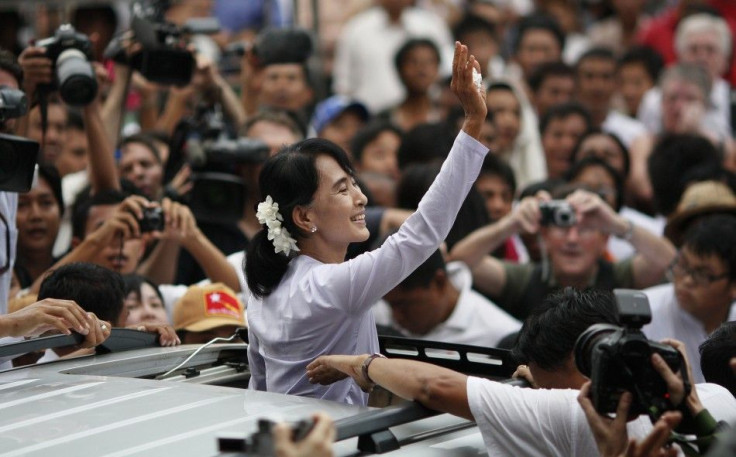Myanmar Election Results: Aung San Suu Kyi Victorious

Myanman activist Aung San Suu Kyi and the opposition National League for Democracy (NLD) declared victory after Sunday's elections. Speaking to thousands of supporters from party headquarters in Yangon, the Nobel Peace Prize laureate hail the success as the beginning of a new era for politics in Myanmar (also known as Burma).
The vote marked the first time since the 1990 general election that the NLD has participated openly in a Burmese vote. Suu Kyi's party won 392 of the 492 seats in the 1990 elections, but the government refused to recognize the results.
In the 2012 poll, the official Union Election Commission said that Suu Kyi and her party took 35 of the available 45 parliament seats, but the NLD claims it swept the elections by winning all 44 of the constituencies in which it ran candidates, according to Reuters. Burma's Parliament has a total of 662 representatives, and the military-backed Union Solidarity and Development Party still controls 80 percent of the seats.
“What is important is not how many seats we have won, although of course we are extremely gratified that we have won so many, but the fact that the people are so enthusiastic about participating in the democratic process,” Suu Kyi told supporters at NLD headquarters on Monday.
“We hope that this will be the beginning of a new era.”
Suu Kyi, who spent 15 years under house arrest because of her pro-democracy activism, was voted the representative for the Kawhmu constituency.
After 50 years of military rule, the elections are Burma's latest step away from the political repression of the junta. Since taking office in March, 2011, President Thein Sein and his civilian government have been steadily marching toward reform.
The elections, along with the recent release of political prisoners, may persuade governments like the U.S. and UK to lift sanctions against Burma. The U.S. is holding the economic restrictions over Sein's government as a way to test its commitment to reform, but critics suggest that the sanctions are hurting progress because they are slowing the development of the lower and middle classes.
“It’s too early to know what recent progress means and whether it will be sustained,” U.S. Secretary of State Hillary Clinton told reporters in Istanbul yesterday.
“There are no guarantees about what lies ahead for the people of Burma, but after a day responding to a brutal dictator in Syria who would rather destroy his own country than let it move toward freedom it is heartening to be reminded that even the most repressive regimes can reform and even the most closed societies can open.”
As noted by Bloomberg, opening the sanctions could bring Burma significant investment from companies like General Electric and Standard Chartered Plc.
© Copyright IBTimes 2024. All rights reserved.











